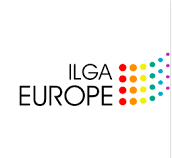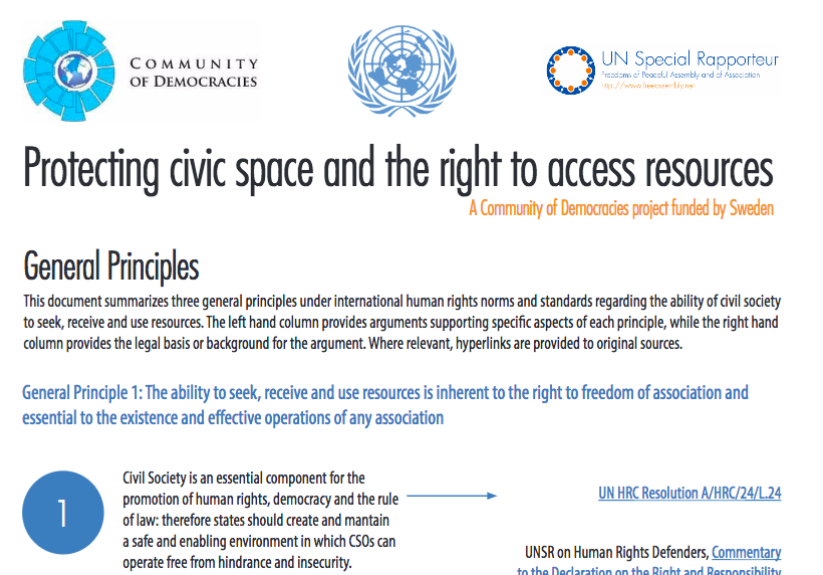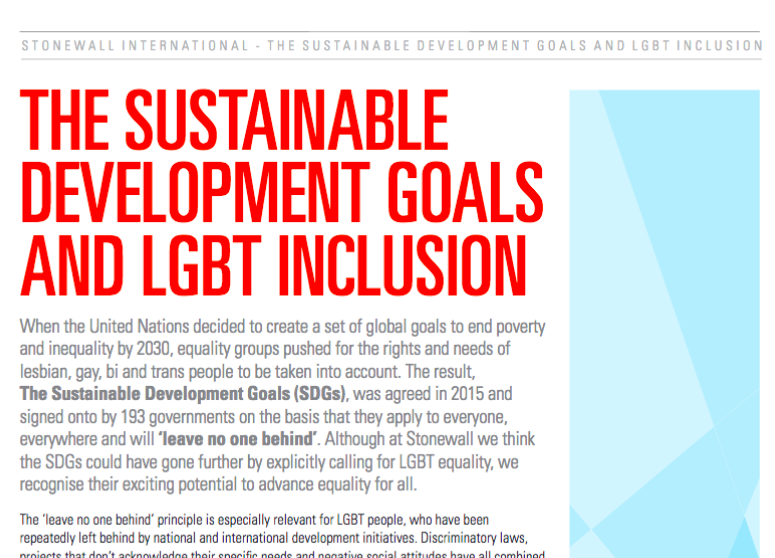GPP Statement to the
Global LGBTI Human Rights Conference
Non Violence, Non Discrimination and Social Inclusion
July 13rd to 15th, 2016 – Montevideo, Uruguay
GPP Statement, Global LGBTI Human Rights Conference 2016
The Global Philanthropy Project (GPP[1]) welcomes the Global LGBTI Human Rights Conference – Non Violence, Non Discrimination and Social Inclusion, to be held in Montevideo, Uruguay from July 13-15, 2016, as a historic opportunity for government, civil society, and private and public philanthropy to work in strategic partnership to advance lesbian, gay, bisexual, transgender and intersex (LGBTI) human rights across all regions of the world.
Informed by GPP’s members’ experience and expertise in international LGBTI funding, and research that GPP has produced in the lead up to the Montevideo conference, the following statement provides recommendations for strengthening the role that governments and private and public philanthropy can play in supporting local, national, regional and global movements for LGBTI human rights.
The increasing number of governments committed to challenging homophobia, transphobia, and violence and discrimination against intersex people affirms that the rights and freedoms enshrined in international human rights law apply equally to LGBTI persons. GPP firmly believes that LGBTI people, through social justice movements, organizations and other mechanisms of civil society, must play the lead role in shaping the path towards a world that is free of violence and discrimination on the basis of sexual orientation, gender identity, gender expression and sex characteristics.
GPP calls on governments to ensure that civil society are treated as equal coalition partners in establishing more effective mechanisms for coordination, including through the proposed Equal Rights Coalition. This must include providing resources and structuring coordination mechanisms to ensure their full and active participation. In addition, recognising the historic and ongoing role that private and public foundations play in local, national, regional and global LGBTI movements, GPP looks forward to taking an active and supportive role in effective coordination and cooperation amongst all actors working to advance LGBTI human rights across the world.
Governments should reaffirm in the concluding document that all Sustainable Development Goals (SDGs) are applicable to all persons regardless of their sexual orientation, gender identity, gender expression and sex characteristics. Resources should be dedicated to developing practical ways in which such inclusion can be incorporated into the full range of policies and programs that are being developed to achieve the SDGs by 2030. Further governments should ensure that the application of the SDGs to LGBTI persons is included within ongoing global, regional and national-level review processes, and civil society organizations are adequately resourced to participate in such processes.
Governments and philanthropic foundations must step up the pace in increasing the amount of funding directed towards LGBTI issues. Although the past few years has seen an increase, current funding for LGBTI issues remains unacceptably low. In 2013-4, for every US$100 in international aid and assistance that governments awarded, only 4 cents explicitly focused on LGBTI issues, and for every US$100 awarded by foundations, only 13 cents was explicitly LGBTI-focused[2].
There needs to be an increasing prioritization of support for the work of LGBTI organizations in the Global South and East. The development of evidence and advocacy by multilateral institutions and international non-governmental organizations plays and will continue to play, an important role in the push for global equality for LGBTI persons. However, aș noted by the Global Resource Report, the amount of resources directed towards LGBTI organizations based in the Global South and East is inverse to the world’s population[3]. Future funding flows must match the increasing needs of LGBTI movements taking place across all regions of the world.
Funding should be informed by, and match, the diverse needs of LGBTI movements. Funders have the responsibility, through global and regional conferences, commissioning research, and dialogue with activists at the national and local level through embassies, travel, foundation offices or intermediaries, to have their funding be informed by the needs of LGBTI movements in the Global South and East.
In particular, governments should strive to make their funding:
- Easier to access and manage, both through intermediaries that successfully work in partnership with Global South and East LGBTI organizations as well as by lowering the application thresholds required to receive government funding and developing capacity-building pathways for LGBTI groups on the ground to access funding directly[4];
- Flexible, by being responsive to grantees’ needs to adapt and change their work based on the dynamic context in which they are working; in addition, by increasing the amount of funds awarded as general operating support, which is currently less than one in every five dollars given to LGBTI organizations[5];
- Long-term and consistent, by investing in LGBTI organizations over multiple years as well as during periods of crisis, to provide them with the stability to address the challenges that they, and the communities they work for, face in the path towards progress[6].
Greater funding attention must be given to lesbian, bisexual, transgender and intersex issues. In 2013-14, 5% of LGBTI funding in the Global South and East was dedicated specifically to lesbian and bisexual, and queer women, and only US$136,687 was given to projects that focused on the needs of bisexuals. Intersex issues received less than 1% of the total LGBTI funding in the Global South and East[7]. Whilst there has been an increase in the amount of funding and attention to trans issues in recent years, there is still a significant gap between the need and the resources available, with more than 50% of trans group surveyed in 2013 operating on an annual budget of less than US$10,000[8].
Governments and philanthropic foundations committed to funding LGBTI issues should also pay greater attention to the multiple, intersecting populations within LGBTI communities, including immigrants, refugees and asylum seekers; ethnic minorities; people with disabilities; sex workers; people who use drugs; and, incarcerated and formerly incarcerated people, amongst others[9]. Funding to address these intersecting populations should be directed both towards LGBTI organizations to support them to address the diverse needs of their community and organizations established to address these various populations in order to support them to be more LGBTI-inclusive.
Diplomatic and funding strategies for addressing closing civil society space must be LGBTI inclusive. Governments and philanthropic foundations should recognize the closing space for civil society taking place around the world as a significant threat to LGBTI movements. Attacks on LGBTI human rights defenders and organizations must be challenged as attacks on civil society and human rights in general, rather than being singled out as a specific or “special” issue, and attention given to building unity across civil society platforms[10]. In general, diplomatic support for LGBTI rights should be offered as part of a broader commitment to all human rights, recognising that human rights are universal, interrelated, interdependent and indivisible.
Footnotes
[1] Global Philanthropy Project is a collaboration of funders and philanthropic advisors working to expand global philanthropic support to advance the human rights of lesbian, gay, bisexual, transgender, and intersex (LGBTI) people in the Global South and East. www.globalphilanthropyproject.org
[2] Funders for LGBTQ Issues and Global Philanthropy Project. (2016). 2013-2014 Global Resources Report: Philanthropic and Government Support for Lesbian, Gay, Bisexual, Transgender, and Intersex Communities, Page 7. Retrieved from GPP website: https://globalphilanthropyproject.org/2016/06/23/2013-2014-global-resources-report/
[3] 2013-2014 Global Resources Report, Page 9.
[4] Cook, Barbary and Bia Vieira. (2016). The Road to Successful Partnerships:How governments in the Global North can effectively partner with intermediary organizations to support LGBTI communities in the Global South and East, Page 5. Retrieved from GPP website: https://globalphilanthropyproject.org/2016/07/03/the-road-to-successful-partnerships/
[5] Ibid, Page 13.
[6] Davis, Meg. (2016). The Perfect Storm: The closing space for LGBT civil society in Kyrgyzstan, Indonesia, Kenya, and Hungary. Page 5. Retrieved from GPP website: https://globalphilanthropyproject.org/2016/04/22/perfectstormreport/
[7] 2013-2014 Global Resources Report, Page 22.
[8] Eisfeld, J, Gunther, S and Shlasko, D. (2013). The State of Trans* and Intersex Organizing: A case for increased support for growing but under-funded movements for human rights. New York: Global Action for Trans* Equality and American Jewish World Service. Retrieved from AJWS website: https://ajws.org/wp-content/uploads/2015/05/ajws_trans-intersex-funding-report.pdf
[9] 2013-2014 Global Resources Report, Page 24.
[10] The Perfect Storm, Page 5.
About GPP
Global Philanthropy Project (GPP) is a collaboration of funders and philanthropic advisors working to expand global philanthropic support to advance the human rights of lesbian, gay, bisexual, transgender, and intersex (LGBTI) people in the Global South and East.
Established in 2009, GPP’s 16 member organizations include many of the leading global funders and philanthropic advisors for LGBTI rights. As the first international cohort of LGBTI funders, GPP is internationally recognized as the primary thought leader and go-to partner for donor coordination around global LGBTI work.
More information: www.globalphilanthropyproject.org
GPP Staff
Matthew Hart, Coordinator
mhart@globalphilanthropyproject.org
Ezra Nepon, Associate
enepon@globalphilanthropyproject.org
GPP Members
American Jewish World Service
Arcus Foundation
Astraea Lesbian Foundation for Justice
Dreilinden gGmbH
Ford Foundation
Fund for Global Human Rights
Foundation for a Just Society
Global Fund for Women
Hivos
Mama Cash
Open Society Foundations
The Other Foundation
Sigrid Rausing Trust
UHAI – the East African Sexual Health and Rights Initiative
Urgent Action Fund for Women’s Human Rights
Wellspring Advisors



